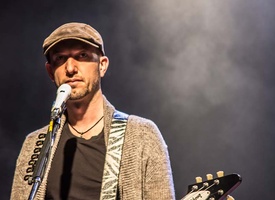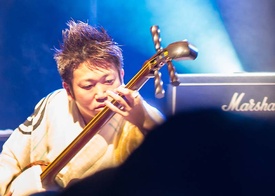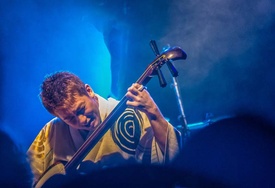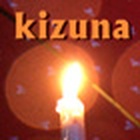“I was scared of old, distant memories
Now I’ve become strong and tall
If the night will
even if there is nothing left in the world,
the light will come
When will it come again?”
—from “Headlight” (2012), Monkey Majik
Monkey Majik and the Yoshida Brothers toured together on a three city “SOS Tsunami Relief” mini-tour of NYC, Toronto and Ottawa at the end of last November.

Maynard Plant, Monkey Majik (Photo credit: Paul Cramer) * All photos taken at the Mod Club in Toronto on Nov. 18, 2012.
Based in Sendai, this Canadian and Japanese band was formed in 2000. They are fronted by Maynard and Blaise Plant who have done a series of fundraising concerts in Japan and North American for the hundreds of thousands of tsunami survivors of 3-11 in Tohoku who are still displaced and in need of help.
The situation in Tohoku Region remains a dire and complex one: the remarkable death toll (15,878 confirmed dead, 2,713 still missing); the wholly incompetent way that the governing Minshuto Party dealt with the aftermath of the tsunami and nuclear disasters. (If you read president of the Canadian Coalition for Nuclear Responsibility, Dr. Gordon Edward’s writings, the issue of the damaged nuclear Fukushima power plants continues and too little is being done about it.)
Monkey Majik consists of the guitar playing Plant brothers Maynard, 37, and Blaise, 32, from Ottawa, Ontario; drummer “tax” (Takuya Kikuchi), 37, from Sendai and bassist “DICK”, 34, from Sapporo. The shamisen playing Yoshida Brothers, Ryoichiro, 35, and Kenichi, 33, are from Noboribetsu, Hokkaido, and play the “tsugaru jamisen” style which originates in Tohoku. The two groups collaborated on the 2007 hit single “Change”.
I interviewed MM and the Yoshida Brothers before their concert at the Mod Club in Toronto.
* * * * *
Are there any personal stories about 3-11 that anybody would like to share?
Maynard: It has taken over my life entirely at this point and, thus, has had an extreme effect on our songwriting.
Monkey Majik and the Yoshida Brothers’ “SOS Tohoku Relief Tour.” How did this collaboration with the Yoshida Brothers come about?
Maynard: When we first contacted them they were really busy and on tour in North America. When we caught up with them in Tokyo we showed them the song (“Change”) that we wanted to collaborate on and they liked it. Since then we’ve become friends for shows and even drinks.
Kenichi Y: It was the first time we ever collaborated with a group like MM. We wanted to hear their sound first. We were surprised that it and feeling of the music is very close to what we play even though the styles are different. The feeling and spirit are very close. This is most important to us.
But your music is very traditional Japanese…
Ryoichiro Y: In our shamisen music we find that feeling in the MM music too. That is why we agreed to the collaboration.
When I first heard your music 10 years ago, it sounded very “western” to me.
Kenichi Y: When we compose music, there are some elements of western guitar and music as well. That’s why you felt that connection.
Why do this tour now?
Maynard: We’ve always wanted to go on a tour with Yoshida Kyodai in Japan but there are always schedule conflicts. We have become good friends and have always talked about doing this.
Is this the first time that you have toured together then?
Blaise: Yes. It’s really exciting to introduce the Yoshida Brothers to our fans here in Canada too.
Maynard: Some of our songs like “Change” have done well in Japan, but they have done even better overseas. In the five years since it was released it is still one of our most popular songs outside of Japan. We’ve always wanted to do it together live with the Yoshida Brothers on tour.
What is the condition of the affected areas now?
Blaise: We live close to those areas. Almost every town is still almost in complete ruins. It is slowly getting better and better but it is a long way from being what it was. There is still a lot of talk about starting projects to get communities back on their feet.
Why did the Yoshida Brothers join this fundraising tour with MM?
Kenichi Y: Tsugaru Shamisen was born in Tohoku area originally. We would like to deliver the power of Tohoku to people in Japan and the whole world through this instrument. This is the biggest mission we as the Yoshida Brothers can do.
We should never forget this disaster and we want to hand down this feeling to the younger generations.
How has 3-11 affected your personal lives?
Maynard: Anyone living in that area was affected. Immediately after 3-11 we did several months of volunteer work. We called Kenichi and several other artists. There is only so much you can do with your hands, if we joined our hands together and used a tool like music what could we do? Something we could do right away was do a charity concert. We are going into our third one in Japan, “SendAi,” (‘ai’ means love in Japanese).
It was thanks to a lot of friends of ours from Tokyo who came up to help with the effort, camping out for two or three months and helping out with the effort in a lot of the devastated areas. We knew that this is something that is going to go on for years and years. We had a duty to act and meet the problem head on and for the long term: a charity event is one way we could do that. We’ve done a charity show every six months or so.
What other fundraisers do you have planned?
Maynard: Our fundraising efforts have centered around the “SEND愛“ project.
To date, we have raised more than $250,000 dollars (CDN) and are expecting to increase that number by year’s end thanks to another sold out charity concert at NHK Hall on December 21st.
This is something we’ll keep going for as long as it needs us. It is bigger than us. It is a small contribution that we can make but we are involved in it on a daily basis; even in our songwriting it is not something that we could possibly erase out of our head. We always write songs about our daily experiences.
For us here in Canada, we are out of touch with what is happening in Tohoku. What do you want us to understand about what conditions there now are like?
Maynard: I think that people understand what went on. What we want everybody to know is that Sendai is not a scary place. There is now a stigma even amongst Japanese in Japan, especially given the nuclear situation in Fukushima. People are worried about radiation levels.
Canadians need to know that Sendai itself is still a safe and wonderful place.
Blaise: A lot of people from all over the world, including Canadians came to places like Tagajyo, Shichigahama, and Ishinomaki to help. All of the locals, including us, are very grateful for this.
What is the best way that Canadians can help the 3-11 survivors now?
Blaise: Tourism. I know a lot of people who lost family members, children, their livelihoods… Visit Tohoku to show your support and know that Japan is still a great country to visit. We aren’t saying skip Kyoto, but make Tohoku and Sendai one of your stops.
To donate to the on-going 3-11 tsunami recovery effort, visit the redcross.ca website.
© 2013 Norm Ibuki









